Another link-to-comments post... I'm criminally unable to resist baiting Glenn Kenny, the erudite proprietor of Some Came Running. With the result that I sometimes end up putting more time into comments on his posts than anything written here! Here's a highlight or two:
-Arguing about Howard Hawks and John Hughes
-Arguing about Eastwood, and dialogue
-Arguing about Lester Bangs, and Matt Zoller Seitz
-Arguing about Carol Reed and auteur theory
-Arguing about Godard
There's nothing at that Read more link! It's just a default!
The blog of Daniel McKleinfeld, covering games, movies, and whatever else I wanna talk about.
Tuesday, November 9, 2010
Saturday, November 6, 2010
Documenteur
Though Agnes Varda has said that Documenteur is her favorite film, it's not her best. Despite an opening statement that all gestures are inherently false, the movie's non-acting, first draft dialogue, and awkward dubbing never becomes an effective style. Instead it's just alienating in a non-Brechtian sense, making it hard to get as emotionally involved in the film as the director clearly is. Meanwhile the sedate montage and script keep the film from achieving much intellectual frisson. But Varda's visual knack is as strong as ever, and the film is, for all its script problems, an incredibly powerful evocation of depression's effect on vision.
Part of the movie's trouble may be that the story, inspired by Varda's painful separation from husband Jacque Demy, was just too personal for her to achieve the compassionate yet unforgiving perspective of her other films. In Cleo From 5 To 7, for example, Varda is at once skewering Cleo's narcissism while remaining deeply sympathetic to her fears of losing the beauty she's utterly dependent on. Similarly, Varda's masterpiece Vagabond exudes deep sorrow for its protagonist's lonely death while never forgetting that she's a pain in the ass whose fate is pretty much her own damn fault. Even a documentary like Ydessa & The Bears teases the subject's self-dramatizing grandiosity (especially embarrassing when placed beside the Holocaust memories Ydessa's work deals with) while acknowledging the power of her emotions.
No such tension is achieved in Documenteur; the circumstances behind the protagonist's separation are never touched on, her love for her child is never problematized, even her sorrow is a little generic. Despite an occasional bout of willfulness or temper, and Sabine Mamou's interesting face, there's just not much to identify Emile, the protagonist, as a unique individual, or make her anything but a transparent reactor to circumstances. Worse still, in the film seems to aim for a simple identification with its lead that is much more conventional than what Varda usually pulls off with such aplomb. When she cries, we're to cry along with her, and when she succeeds we're prodded to admire; this is cinema rhetoric of the most ordinary kind, and it's a shame to see Varda fall into it.
Varda's photographic eye, however, is always unique, and that alone makes the movie worth a look. Too many cinematographers, and too many viewers, think that saturated colors and high contrast equals good photography. What's striking about Documenteur is how much Varda accomplishes visually with natural light, soft contrast, and deliberately dull colors. Though obviously shot quickly and cheaply, the look is reminiscent of beautiful 70s productions like McCabe and Mrs Miller or Alice Doesn't Live Here Any More.


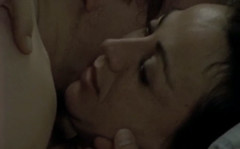
The title Documenteur blends the French words for "documentarian" and "liar", just as the film blends documentary and fictional (albeit roman-a-clef, semi-fictions). But more intriguingly, the film's visual texture suggests the way that plain sight can lie, manipulated by circumstances. Emile is a woman in the throes of despair, but unable, due to the obligations of child-rearing, to succumb to that despair with romantic dissipation. Instead she crawls through her day, hoping the feelings will go away, and in the meantime living as though submerged in dirty water. Varda objectifies this situation by shooting the world's most famously bright city with deliberate dullness that poses as objectivity. The loose blocking and natural light exudes you-are-there documentary realism, but it's all deliberately muddy.

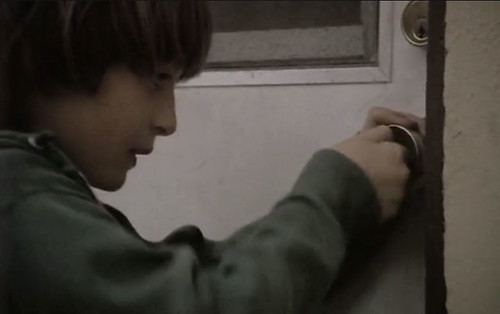
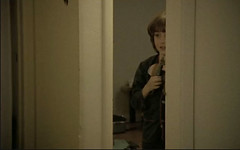
One of depression's most insidious powers is its ability to pose as accurate perception, as though the hollowed-out world the sufferer sees is truer than the illusions of the happy, and Documenteur perfectly captures both the grimness of that world and its pretence of simple reality. The camera is both documentarian and liar, it's very identification with the depressed protagonist compromising its ability to capture reality.
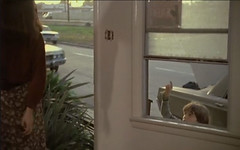
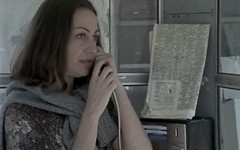
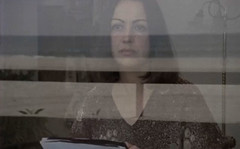
The film is also notable for its ground-level view of Los Angeles, an L.A. without palm trees or movie stars. Keeping her eye downcast, Varda ably captures the placeless residential districts of the city, and its low-key immigrant communities. The shots of dumpster-diving for furniture, or fishing on Venice Beach, evoke precisely what day-to-day life is like in L.A.'s eternal June, while the scenes in the luxurious beach house portray how the rich of late-70s L.A. built faux-organic hermitages that produced the illusion of nature while remaining sealed off from the outside.
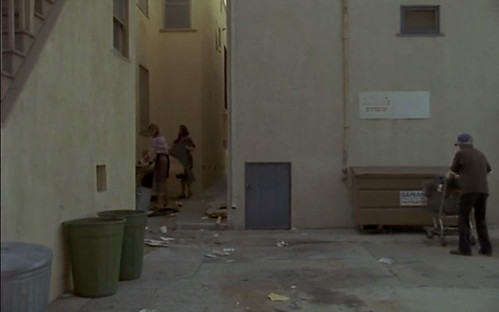

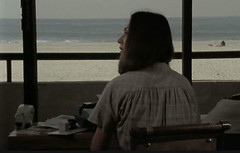

Part of the movie's trouble may be that the story, inspired by Varda's painful separation from husband Jacque Demy, was just too personal for her to achieve the compassionate yet unforgiving perspective of her other films. In Cleo From 5 To 7, for example, Varda is at once skewering Cleo's narcissism while remaining deeply sympathetic to her fears of losing the beauty she's utterly dependent on. Similarly, Varda's masterpiece Vagabond exudes deep sorrow for its protagonist's lonely death while never forgetting that she's a pain in the ass whose fate is pretty much her own damn fault. Even a documentary like Ydessa & The Bears teases the subject's self-dramatizing grandiosity (especially embarrassing when placed beside the Holocaust memories Ydessa's work deals with) while acknowledging the power of her emotions.
No such tension is achieved in Documenteur; the circumstances behind the protagonist's separation are never touched on, her love for her child is never problematized, even her sorrow is a little generic. Despite an occasional bout of willfulness or temper, and Sabine Mamou's interesting face, there's just not much to identify Emile, the protagonist, as a unique individual, or make her anything but a transparent reactor to circumstances. Worse still, in the film seems to aim for a simple identification with its lead that is much more conventional than what Varda usually pulls off with such aplomb. When she cries, we're to cry along with her, and when she succeeds we're prodded to admire; this is cinema rhetoric of the most ordinary kind, and it's a shame to see Varda fall into it.
Varda's photographic eye, however, is always unique, and that alone makes the movie worth a look. Too many cinematographers, and too many viewers, think that saturated colors and high contrast equals good photography. What's striking about Documenteur is how much Varda accomplishes visually with natural light, soft contrast, and deliberately dull colors. Though obviously shot quickly and cheaply, the look is reminiscent of beautiful 70s productions like McCabe and Mrs Miller or Alice Doesn't Live Here Any More.



The title Documenteur blends the French words for "documentarian" and "liar", just as the film blends documentary and fictional (albeit roman-a-clef, semi-fictions). But more intriguingly, the film's visual texture suggests the way that plain sight can lie, manipulated by circumstances. Emile is a woman in the throes of despair, but unable, due to the obligations of child-rearing, to succumb to that despair with romantic dissipation. Instead she crawls through her day, hoping the feelings will go away, and in the meantime living as though submerged in dirty water. Varda objectifies this situation by shooting the world's most famously bright city with deliberate dullness that poses as objectivity. The loose blocking and natural light exudes you-are-there documentary realism, but it's all deliberately muddy.



One of depression's most insidious powers is its ability to pose as accurate perception, as though the hollowed-out world the sufferer sees is truer than the illusions of the happy, and Documenteur perfectly captures both the grimness of that world and its pretence of simple reality. The camera is both documentarian and liar, it's very identification with the depressed protagonist compromising its ability to capture reality.



The film is also notable for its ground-level view of Los Angeles, an L.A. without palm trees or movie stars. Keeping her eye downcast, Varda ably captures the placeless residential districts of the city, and its low-key immigrant communities. The shots of dumpster-diving for furniture, or fishing on Venice Beach, evoke precisely what day-to-day life is like in L.A.'s eternal June, while the scenes in the luxurious beach house portray how the rich of late-70s L.A. built faux-organic hermitages that produced the illusion of nature while remaining sealed off from the outside.




Wednesday, June 30, 2010
What the fuck is Alain Resnais thinking?
I can't remember the last time I experienced such a gap between what the reviews told me and what a movie delivered as Alain Renais' Wild Grass. According to reviews good and bad, it's "cute", "freewheeling", "zany", and a lot of other adjectives that might lead you---certainly led me---to think it's a brightly-hued, albeit surreal, romantic comedy, ruefully self-aware and polished with Gallic wit.
Wild Grass is nothing of the sort. Like Resnais' classic Last Year At Marienbad, it's a horror movie about the fundament of misogyny: a man imposing his ontology on a woman with no regard for her subjectivity---but this time made much creepier by the director's ambivalent complicity in that imposition. It's also genre-damaged, confused, and profoundly slippery; I still can't decide if it's a cunning attack on the romantic comedy and the romantic thriller, or merely an old Frenchman's grumbling act of gender senescence, like listening to your Grandpa complain about not being able to pat the waitress' butt.
Misogyny drives the plot at every step, beginning with Margaritte Muir getting her purse (ahem) snatched by a young man outside a shoe store. Elderly ex-con Georges Palet finds her wallet, but before he can return it, he becomes fixated on Muir's ID photo. She calls to thank him for the purse's return, but like many a self-important male, Palet convinces himself that a simple act of decency merits a free pass to her vagina. He begins--- really there's no other word for this---stalking Muir, starting with angry phone calls and escalating to tire slashing. Muir calls the police, who warn him off in a marvelously-observed scene charting just how to give a suspect enough rope.
Now here's where things get really icky. When Muir attempts to confront Palet at a movie theater, she finds herself feeling affectionate, maybe even a little in love with her stalker. She ignores her friend Josepha's warnings and starts more or less pursuing him, though always insisting that his long-suffering wife come along. Her attraction to Palet (every woman's attraction to Palet!) is never explained, or even formally accounted for; even a tipsy Josepha seems unable to resist his liver-spotted charms, going from angry and afraid to putty in his hands the instant he moves in for a kiss.
The idea of an bitter, charmless old man who's irresistibly attractive to woman thirty years younger than him is a pretty standard trope of commercial cinema (and the repulsive late novels of Phillip Roth, prominently displayed at one point in the film), and it's disappointing that Resnais can't bust out something at least more unusual. Worse yet, the script blatantly violates the Bechdel rule, portraying a world where women, when alone, talk about nothing but cute boys. It's hard to believe the man who made Last Year At Marienbad and Hiroshima, Mon Amour, either of which could serve as surrealist versions of The Handmaid's Tale, is making any kind of prescriptive pronouncement about womanhood. And there's certainly enough metacinematic gags to make me resist simply psychologizing the characters, or treating this behavior as reflecting Resnais' assumptions about the world. But there's not a firm enough satiric perspective to make the idea that this film is simply an apologia for sullen male privilege completely dismissible.
The semiotics of the movie make it even harder to pin down what Resnais' attitude towards his characters' lunacy is. As Palet's stalking escalates, Resnais deploys the long, wide shots and skittering strings of a standard-issue woman-in-peril thriller. But then, many of the scenes with Palet and Muir are scored with chipper jazz, and surrounded by bright colors, as though Resnais was making a parody of romantic comedies, where behavior that would get people put in a loony bin is just accepted as charming. In interviews, Resnais has said it's a movie about l'amour fou, but there's not much amour on display here, just a series of purely selfish demands, made with contempt and executed joylessly. It's like The Stepford Wives from the husbands' point of view.
The result isn't so much fascinatingly ambivalent as deeply unsatisfying, in no small part because the movie pivots on deliberately irrational behavior but bounces between genres where behavior is everything.. In a comedy, especially a parody, we accept characters doing ridiculous things because that's what happens in comedy. But if you're making a thriller, implausible action kills audience tension; it's not very scary to watch a moron walk off a cliff. Resnais refuses to commit either way, but it seems less like he's trying to do both than like he's trying to do neither---the shots aren't iconic enough to be comedy, nor withholding enough to thrill. There's occasionally low-comedy situations, like an extended open-zipper gag, but they're never very funny, and the sheer ferocity of Patel's contempt for women (and the movie's complacent furthering of that contempt) makes the laughs stick in the throat.
Many of the critics consider it "prosaic" to treat the movie's specifically gendered freakiness as being at all relevant to actual gender politics. But no one seems to have an idea what, if not misogyny, the movie is actually about. Is this an elaborate fantasy of Patel's that Resnais is cooly transcribing, like a highbrow Brent Easton Ellis? The film opens with a shot of wild grass piercing the pavement, but Georges is a relentless mower of his carefully-planted lawn; is this a satire of bourgeois repression? If so, it would need to explode its narrative more than it does, the way Resnais' early films emphatically did. Like Palet, the movie seems to have something violence and uncontrollable lurking beneath its manicured facade, but it never quite allows it to escape, and the result is a painful wreck.
Wild Grass is nothing of the sort. Like Resnais' classic Last Year At Marienbad, it's a horror movie about the fundament of misogyny: a man imposing his ontology on a woman with no regard for her subjectivity---but this time made much creepier by the director's ambivalent complicity in that imposition. It's also genre-damaged, confused, and profoundly slippery; I still can't decide if it's a cunning attack on the romantic comedy and the romantic thriller, or merely an old Frenchman's grumbling act of gender senescence, like listening to your Grandpa complain about not being able to pat the waitress' butt.
Misogyny drives the plot at every step, beginning with Margaritte Muir getting her purse (ahem) snatched by a young man outside a shoe store. Elderly ex-con Georges Palet finds her wallet, but before he can return it, he becomes fixated on Muir's ID photo. She calls to thank him for the purse's return, but like many a self-important male, Palet convinces himself that a simple act of decency merits a free pass to her vagina. He begins--- really there's no other word for this---stalking Muir, starting with angry phone calls and escalating to tire slashing. Muir calls the police, who warn him off in a marvelously-observed scene charting just how to give a suspect enough rope.
Now here's where things get really icky. When Muir attempts to confront Palet at a movie theater, she finds herself feeling affectionate, maybe even a little in love with her stalker. She ignores her friend Josepha's warnings and starts more or less pursuing him, though always insisting that his long-suffering wife come along. Her attraction to Palet (every woman's attraction to Palet!) is never explained, or even formally accounted for; even a tipsy Josepha seems unable to resist his liver-spotted charms, going from angry and afraid to putty in his hands the instant he moves in for a kiss.
The idea of an bitter, charmless old man who's irresistibly attractive to woman thirty years younger than him is a pretty standard trope of commercial cinema (and the repulsive late novels of Phillip Roth, prominently displayed at one point in the film), and it's disappointing that Resnais can't bust out something at least more unusual. Worse yet, the script blatantly violates the Bechdel rule, portraying a world where women, when alone, talk about nothing but cute boys. It's hard to believe the man who made Last Year At Marienbad and Hiroshima, Mon Amour, either of which could serve as surrealist versions of The Handmaid's Tale, is making any kind of prescriptive pronouncement about womanhood. And there's certainly enough metacinematic gags to make me resist simply psychologizing the characters, or treating this behavior as reflecting Resnais' assumptions about the world. But there's not a firm enough satiric perspective to make the idea that this film is simply an apologia for sullen male privilege completely dismissible.
The semiotics of the movie make it even harder to pin down what Resnais' attitude towards his characters' lunacy is. As Palet's stalking escalates, Resnais deploys the long, wide shots and skittering strings of a standard-issue woman-in-peril thriller. But then, many of the scenes with Palet and Muir are scored with chipper jazz, and surrounded by bright colors, as though Resnais was making a parody of romantic comedies, where behavior that would get people put in a loony bin is just accepted as charming. In interviews, Resnais has said it's a movie about l'amour fou, but there's not much amour on display here, just a series of purely selfish demands, made with contempt and executed joylessly. It's like The Stepford Wives from the husbands' point of view.
The result isn't so much fascinatingly ambivalent as deeply unsatisfying, in no small part because the movie pivots on deliberately irrational behavior but bounces between genres where behavior is everything.. In a comedy, especially a parody, we accept characters doing ridiculous things because that's what happens in comedy. But if you're making a thriller, implausible action kills audience tension; it's not very scary to watch a moron walk off a cliff. Resnais refuses to commit either way, but it seems less like he's trying to do both than like he's trying to do neither---the shots aren't iconic enough to be comedy, nor withholding enough to thrill. There's occasionally low-comedy situations, like an extended open-zipper gag, but they're never very funny, and the sheer ferocity of Patel's contempt for women (and the movie's complacent furthering of that contempt) makes the laughs stick in the throat.
Many of the critics consider it "prosaic" to treat the movie's specifically gendered freakiness as being at all relevant to actual gender politics. But no one seems to have an idea what, if not misogyny, the movie is actually about. Is this an elaborate fantasy of Patel's that Resnais is cooly transcribing, like a highbrow Brent Easton Ellis? The film opens with a shot of wild grass piercing the pavement, but Georges is a relentless mower of his carefully-planted lawn; is this a satire of bourgeois repression? If so, it would need to explode its narrative more than it does, the way Resnais' early films emphatically did. Like Palet, the movie seems to have something violence and uncontrollable lurking beneath its manicured facade, but it never quite allows it to escape, and the result is a painful wreck.
Tuesday, June 15, 2010
You are a controller
I'm incredibly psyched about the Kinect (a.k.a. Project Natal), Microsoft's upcoming motion controller for the Xbox 360. Many of its titles do indeed look like updated EyeToy titles, and in my book, that's great---if Sonic Free Riders is basically EyeToy Antigrav with a (finally!) working control scheme, I will be overjoyed.
I loved the EyeToy, even with all the gimmicky minigames. Like any sensible person, I found it incredibly immersive to make my body into a controller, and I was delighted by the total concentration induced by the physical gameplay. It's not unlike the effect of playing Rock Band (music, with its deep evolutionary origins, is a handy shortcut to physicality)---instead of the tunnel-vision concentration of most games, you get a kind of effortless oneness.
Unfortunately, a lot of gamers don't seem to feel that way---the comment sections over at Kotaku and Joystiq are full of whining from people who think all this flailing is the opposite of what games are for. Some of this is simple fat-ass don't-wanna-get-off-the-couch laziness, which is worth what it's worth. Some of this is horror at the idea of looking silly, though for those who complain that the people playing the games look like morons, I'd like to ask them if they think people look less moronic while staring slack-jawed at the TV with a controller in their hands.
But what's most prevalent is the typical North American Male horror of being made aware of their body in any way at all. The list of things that completely freak out typical North American Males includes dancing, being cruised, going to the doctor, and, apparently, motion controllers. What all these things have in common is that they make the body cease to be a tool, to be used as transparently as possible, and make the body instead an object in itself, a thing to be considered and evaluated.
In fact, it might be that part of what's driving gamers' horror at the Kinect (and the Wii before it) is a sense that they're losing an essential aspect of video games ---the mediation of an avatar. For a lot of hardcore gamers, much of the appeal of their entertainment of choice is the change to get out of yourself. You get out of your living room and into another, better art-designed world. You get out of your daily grind and into a bunch of challenging yet surmountable tasks. And maybe most exciting for those already deeply alienated from their bodies, you get out of your own meatsack and into a body vastly more responsive, agile, and capable. That sitting on the couch playing games makes your own body even less like that of your digital avatar is a classic irony of addiction.
As Douglas Copeland's Microserfs so ably dissected, much modern tech culture is built upon a foundation of body-horror, and a desperate need for body-escape. Video games ably meet this need, offering the player the chance to become an NFL star, a beefy marine, or a sexy babe gunfighter (and really, what guy hasn't wanted to be in the body of a hot chick, if only so they could play with their own boobs?). But if your body is the controller, then your body has to be subjected to the same sort of stress-testing and evaluation that every new gaming system is subjected to---it's like being cruised by the cattiest of queens! No wonder so many gamers look on motion control with a desperate, frozen sneer, hoping no one dares to glance below their necks.
I loved the EyeToy, even with all the gimmicky minigames. Like any sensible person, I found it incredibly immersive to make my body into a controller, and I was delighted by the total concentration induced by the physical gameplay. It's not unlike the effect of playing Rock Band (music, with its deep evolutionary origins, is a handy shortcut to physicality)---instead of the tunnel-vision concentration of most games, you get a kind of effortless oneness.
Unfortunately, a lot of gamers don't seem to feel that way---the comment sections over at Kotaku and Joystiq are full of whining from people who think all this flailing is the opposite of what games are for. Some of this is simple fat-ass don't-wanna-get-off-the-couch laziness, which is worth what it's worth. Some of this is horror at the idea of looking silly, though for those who complain that the people playing the games look like morons, I'd like to ask them if they think people look less moronic while staring slack-jawed at the TV with a controller in their hands.
But what's most prevalent is the typical North American Male horror of being made aware of their body in any way at all. The list of things that completely freak out typical North American Males includes dancing, being cruised, going to the doctor, and, apparently, motion controllers. What all these things have in common is that they make the body cease to be a tool, to be used as transparently as possible, and make the body instead an object in itself, a thing to be considered and evaluated.
In fact, it might be that part of what's driving gamers' horror at the Kinect (and the Wii before it) is a sense that they're losing an essential aspect of video games ---the mediation of an avatar. For a lot of hardcore gamers, much of the appeal of their entertainment of choice is the change to get out of yourself. You get out of your living room and into another, better art-designed world. You get out of your daily grind and into a bunch of challenging yet surmountable tasks. And maybe most exciting for those already deeply alienated from their bodies, you get out of your own meatsack and into a body vastly more responsive, agile, and capable. That sitting on the couch playing games makes your own body even less like that of your digital avatar is a classic irony of addiction.
As Douglas Copeland's Microserfs so ably dissected, much modern tech culture is built upon a foundation of body-horror, and a desperate need for body-escape. Video games ably meet this need, offering the player the chance to become an NFL star, a beefy marine, or a sexy babe gunfighter (and really, what guy hasn't wanted to be in the body of a hot chick, if only so they could play with their own boobs?). But if your body is the controller, then your body has to be subjected to the same sort of stress-testing and evaluation that every new gaming system is subjected to---it's like being cruised by the cattiest of queens! No wonder so many gamers look on motion control with a desperate, frozen sneer, hoping no one dares to glance below their necks.
Subscribe to:
Posts (Atom)